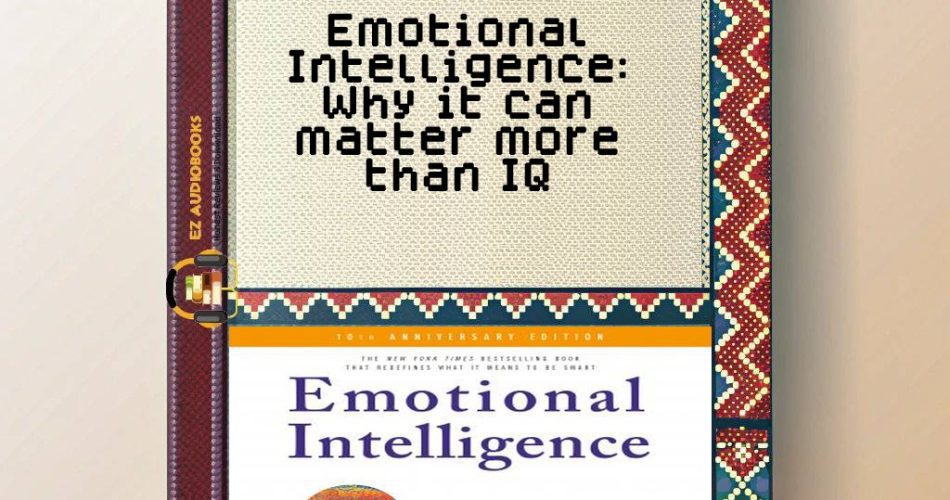Audiobook Sample
Listen to the sample to experience the story.
Please wait while we verify your browser...
- Title: Emotional Intelligence: Why it can matter more than IQ
- Author: Daniel Goleman
- Narrator: Barrett Whitener
- Length: 13:32:07
- Version: Abridged
- Release Date: 01/03/2003
- Publisher: Macmillan Audio
- Genre: Health & Wellness, Mindfulness & Meditation
- ISBN13: 9.78E+12
As a literature professor with a deep fascination for narratives that bridge the personal and the universal, I approached Daniel Goleman’s ‘Emotional Intelligence: Why it can matter more than IQ’ with a keen sense of curiosity. This audiobook, published by Macmillan Audio, offers a profound exploration of how emotional quotient (EQ) often surpasses intellectual quotient (IQ) in shaping our lives. What fascinates me most is how Goleman maps the territory where cognition meets emotion, a crossroads I’ve often pondered in my academic pursuits of storytelling and cultural narratives.
Through a cultural lens, I couldn’t help but connect Goleman’s insights to my own experiences. This reminds me of when I was a visiting professor in Tokyo, delving into Haruki Murakami’s works. Reading ‘Kafka on the Shore’ in both English and Japanese revealed to me how language shapes emotional perception. Similarly, Goleman’s discussion of emotional literacy across contexts resonated with my understanding of how cultural frameworks influence our emotional responses. His argument – that mastering emotions and empathizing with others is often more critical than raw intellect – mirrors the subtle, unspoken emotional currents I sensed in Japanese narratives, where what is felt often outweighs what is said.
Diving into the content, Goleman’s audiobook experience is a treasure trove for anyone interested in health and wellness or mindfulness and meditation. He meticulously outlines how emotional intelligence comprises self-awareness, self-regulation, motivation, empathy, and social skills. These pillars, as he presents them, are not just abstract concepts but practical tools for navigating life’s complexities. I found his evidence-based approach, drawing from psychology and neuroscience, to be a compelling counterpoint to the traditional valorization of IQ. Much like peeling back the layers of an onion – a metaphor reminiscent of Mark Manson’s work in ‘The Subtle Art of Not Giving a F*ck’ – Goleman urges us to confront uncomfortable emotional truths to foster growth.
One of the book’s key strengths is its accessibility. Goleman translates complex psychological research into actionable insights, whether it’s managing personal struggles or enhancing interpersonal relationships. His inclusion of real-life examples – stories of individuals harnessing emotional intelligence to overcome adversity – adds a narrative depth that I, as a literature scholar, deeply appreciate. It’s akin to the pedagogical effectiveness I seek in educational materials; the audiobook serves as both a guide and a mirror, reflecting our own emotional landscapes.
Turning to the listening experience, Barrett Whitener’s narration is a significant asset to this audiobook. His voice carries a measured gravitas that complements the weight of Goleman’s ideas. Whitener’s pacing is deliberate, allowing listeners to absorb the nuanced discussions of emotional mastery and mindfulness. The audio quality is crisp, ensuring that every insight lands with clarity. However, there are moments where a touch more emotional inflection could have elevated the delivery, especially during the personal anecdotes Goleman shares. As someone who analyzed different storytelling mediums during my Contemporary Fiction seminar at Berkeley – where we compared formats of ‘Cloud Atlas’ – I’m attuned to how narration can shape engagement. Whitener’s performance is solid, though not transformative, in bringing the text to life.
While I celebrate the audiobook’s depth, I must offer a balanced perspective. One limitation is that some sections feel repetitive, reiterating the significance of EQ over IQ without introducing fresh angles. For listeners already familiar with self-help or mindfulness literature, certain concepts might seem familiar, though Goleman’s scientific grounding offers a unique lens. Additionally, the audiobook duration, while comprehensive, might feel dense for those seeking a quicker dive into emotional wellness. Yet, these minor critiques do not detract from the overall value of this listening experience, especially for those new to the intersection of psychology and personal growth.
Comparing this work to similar titles, I’m reminded of Mark Manson’s ‘The Subtle Art of Not Giving a F*ck,’ which also challenges conventional self-help tropes. While Manson’s approach is more pragmatic and acceptance-oriented, Goleman’s is rooted in empirical research, offering a more academic exploration of emotional health. Both, however, emphasize choosing what truly matters – whether it’s struggles, as Manson suggests, or emotional competencies, as Goleman advocates. For listeners interested in a more philosophical take, Jonathan Haidt’s ‘The Happiness Hypothesis’ might complement Goleman’s work with its blend of ancient wisdom and modern science.
I recommend this audiobook to anyone seeking to deepen their understanding of emotional intelligence, particularly those in fields like education, leadership, or counseling where empathy and social skills are paramount. It’s also a valuable resource for mindfulness and meditation enthusiasts looking to integrate emotional awareness into their practice. The audiobook experience is enriched by Goleman’s bonus dialogue with Jon Kabat-Zinn, adding a layer of contemplative insight that aligns with wellness goals. While it’s not explicitly mentioned as a free audiobook, I encourage exploring platforms like Audiobooks.com for potential promotions or trials to access this gem.
Reflecting on my own journey with this audiobook, I found myself revisiting moments of personal and professional challenge. Teaching literature often requires balancing intellectual critique with emotional connection to students’ perspectives. Goleman’s emphasis on empathy as a skill – not just a trait – has prompted me to approach classroom dynamics with renewed intentionality. Much like the cross-cultural narratives I study, emotional intelligence transcends borders, reminding us that understanding ourselves and others is a universal language.
As we close this chapter of exploration, I invite you to immerse yourself in this audiobook and uncover your own emotional narratives. Until our next literary journey, keep listening and learning with an open heart. Warm regards, Prof. Emily Chen.

